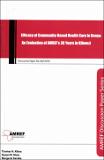| dc.contributor.author | Kibua, Thomas | |
| dc.contributor.author | Muia, Daniel M. | |
| dc.contributor.author | Keraka, Margaret | |
| dc.date.accessioned | 2021-09-29T21:20:06Z | |
| dc.date.available | 2021-09-29T21:20:06Z | |
| dc.date.issued | 2010 | |
| dc.identifier.uri | http://repository.amref.org/handle/123456789/267 | |
| dc.description | The publishers will glad ly consider any request for pern11ss1on to
reproduce part or the whole of this publication wi th the intention
of Increasing its availability to those who need i t. AMREF welcomes
enquiries from Individuals or organisations wishing to use the content
for non-commercial purposes. The organisation would also be grateful
to learn how you are using this publica tion | en_US |
| dc.description.abstract | AMRH has been involved in health development in Kibwezi, Eastern
Kenya, since 1978. Its interventions have evolved in tandem with changes
in community health needs and changes in government priorities. They
have also greatly deepened and expanded in coverage in the 30 years of
working in, for and with this hard-to-reach community. The paper is an
evaluative research aimed at establishing the achievements of this longterm
engagement. It presents the historical evolution of interventions,
assesses AMREF's programmes in relation to national health policy. In
addition, it analyses the success of the various interventions in terms of
project objectives, implementation processes. expected outputs and
outcomes, achievements of partnerships and sustainability and identifies
programme challenges and lessons learned.
Using both secondary and primary data, the paper utilises a combination of
methods to assess the efficacy. effectiveness and sustainability of AMREF"s
inventory. The paper concludes that, although it is difficult to precisely
measure the proportion of AMREF's contribution. successful achievement
of intended outputs a11d measurable or imputed health outcomes confirms
a definite positive contribution to the improvemer1t in the health status of
the commu11ity. In addition. the interventions have had positive results in
terms of health systems strengthening.
The paper presents project·specitic achievements, identifies intervention
programming challenges. and demonstrates that the approach adopted
has produced useful le~sons for improving the health status of communities
through strengthening of health systems. The key lessons which emerge
are that community participation and the use of community resources and
institutions as entry points. understanding the community context and
creating trust. and prior design of an exit strategy are necessary conditions
for the success and sustainability of community-focused interventions. | en_US |
| dc.description.sponsorship | Deputy Director General, AMREF HQ | en_US |
| dc.language.iso | en | en_US |
| dc.publisher | AMREF HQ | en_US |
| dc.relation.ispartofseries | Discussion paper;No. 002/2010 | |
| dc.subject | Community Based Health Care | en_US |
| dc.subject | Kenya | en_US |
| dc.subject | Kibwezi | en_US |
| dc.title | Discussion paper; No. 002/2010 - Efficacy of Community Based Health Care in Kenya - An Evaluation of AMREF's 30 Years. | en_US |
| dc.type | Article, Journal | en_US |

